Iranian Lawyer Reveals Further Arrests In Police Brutality Case
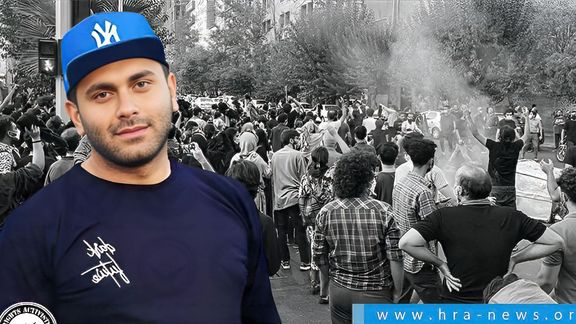
In a rare instance, two police officers and two plainclothesmen in Iran have been detained in connection with the attempted murder of protester Pouria Alipour.

In a rare instance, two police officers and two plainclothesmen in Iran have been detained in connection with the attempted murder of protester Pouria Alipour.
During the initial weeks of the Iranian people's uprising last year, a video surfaced showing one officer driving over Alipour with a motorcycle, while another fired at him from a distance of less than a meter in a suburb of Tehran.
It is a rare case to come to trial in the wake of protests in which over 500 civilians were killed and tens of thousands more rounded up and imprisoned by state security apparatus in the uprising following the death in morality police custody of Mahsa Amini, arrested for the inappropriate use of her hijab.
In an interview with Emtedad News, Alipour's lawyer, Payam Dorafshan, said, "The new allegations include intentional manslaughter, unauthorized shooting, intentional assault, and creating a hostile view towards armed forces, as determined by the military investigator."
The release of the video of Alipour's attempted murder in November 2022 stirred public outrage in Iran. Some social media users described the footage as the "Islamic Republic unfiltered," while others interpreted it as "street-level assassination of dissenters."
Since the beginning of the Women, Life, Freedom uprising, numerous reports of protesters being beaten and mistreated by the security forces of the Islamic Republic have surfaced including mass blinding and state-sanctioned sexual violence, according to Iran's Me Too movement reports.
In addition to the hundreds of citizens killed and thousands detained during the uprising, the families of the plaintiffs have also faced severe pressure from the Iranian government over the past year.
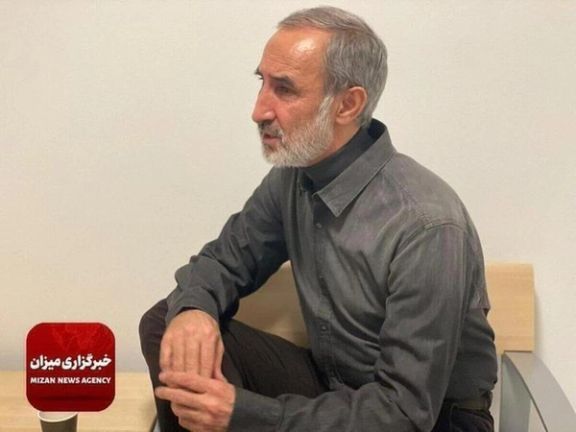
Following appeal, the Stockholm Court of Appeals announced it would uphold the life sentence of former jailor Hamid Nouri, for his role in Iran's 1988 massacres.
In addition to the life sentence, Nouri was also ordered to pay compensation to the families of the victims and political prisoners and faces expulsion from Sweden upon completing his prison term.
It is the first time that an official of the Iranian regime has been prosecuted for his role in the 1988 massacre.Nouri was a former deputy prosecutor at Gohardasht Prison in Karaj near Tehran at the time of the purge of political prisoners which saw around 30,000 people brutally murdered by the regime, around 90% of whom were members of the opposition People's Mojahedin Organization of Iran (MEK), party.
On July 14, 2022, Nouri was initially sentenced to life imprisonment for "war crimes" and "murder" by the Stockholm Regional Court, equivalent to 25 years in Swedish legal terms for which his legal team submitted an appeal.
Arrested on November 6, 2019, at Arlanda Airport in Stockholm, Nouri had dismissed all allegations related to the 1988 executions, labeling the events and charges against him as a "fictional, imaginary, and fabricated story."
The "Death Commissions" in 1988 followed the issuance of a fatwa by Ayatollah Ruhollah Khomeini, ordering the execution of thousands of political and ideological prisoners in the prisons of the Islamic Republic of Iran. The executions were carried out secretly, and burial orders were issued for mass graves.
Some individuals involved in the crime currently hold key positions within the Islamic Republic, including Ebrahim Raisi, the President of Iran, who previously served as the head of the judiciary and was a member of the Death Commissions in Tehran and Karaj.
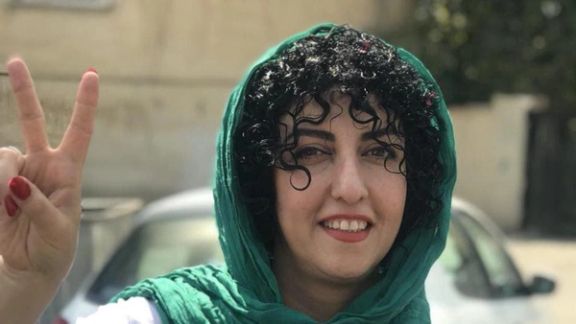
Renowned Iranian activist and Nobel Peace Prize laureate Narges Mohammadi publicly declared her decision to abstain from attending her trial session on Tuesday.
Mohammadi, currently imprisoned, shared the decision through her Instagram account, where she characterized the Revolutionary Court as the "slaughterhouse of the youth" and expressed her unwillingness to participate in what she views as a judicial system influenced by security institutions and extrajudicial elements.
Mohammadi's decision to refrain from the trial is rooted in several concerns, including the perceived lack of independence of the judiciary, the illegality of the Revolutionary Court, secret show trials, and the denial of defendants' right to a fair defense.
The announcement of Mohammadi's trial was made on December 10, with the session scheduled for December 19, her first trial after being honored with the Nobel Peace Prize.
This marks the third trial for Mohammadi, with recent proceedings focusing on her activities within the confines of the prison and her anti-government statements. Mohammadi, in her Instagram post, labeled the prison as the "stronghold of the despotic government," asserting that such methods have failed in suppressing the determination of courageous prisoners.
In her previous two cases during her imprisonment, Mohammadi was sentenced to 27 months in prison along with four months of street cleaning and community service.
The Defenders of Human Rights Center, in a report following the Nobel Peace Prize ceremony, branded the latest prosecution against Mohammadi a retaliatory measure by the judiciary against her years of human rights advocacy.
The Nobel Peace Prize ceremony in 2023 took place on December 10 in Oslo, Norway, without Mohammadi's presence. Her children, Ali and Kiana Rahmani, accepted the prestigious award on her behalf.
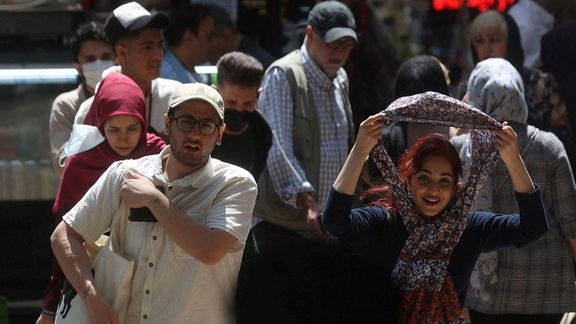
Nine former politicians and civil activists in Iran have demanded the abolition of compulsory hijab, calling it “double suppression” of women.
“The Islamic regime has resorted to hijab to double its discrimination against women in an era when human equality, regardless of gender, race, ethnicity, creed and religion, plays a pivotal role in progressive human discourse,” a statement published Monday by Zeitoun news website said.
“The cruel and violent measures to enforce the mandatory hijab have been disastrous not only for women, but also for their fathers, husbands, and brothers. In other words, Iranian men have also found it difficult to bear so much oppression of women,” said the statement six of the signatories of which are also prominent political and intellectual figures.
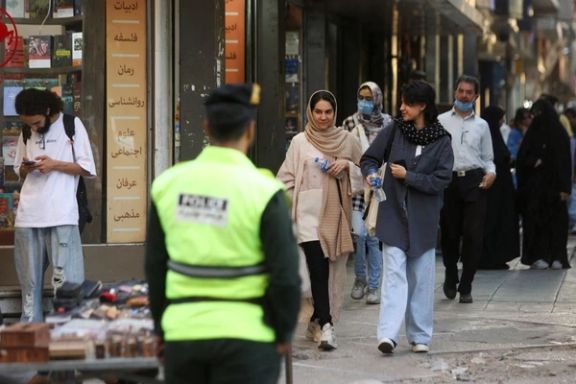
Most of the signatories, including prominent female Islamic scholar Sedigheh Vasmaghi, are known as “religious intellectuals” in Iranian politics, meaning they advocate a moderate view of Islam.
Vasmaghi, 63, recently removed her veil after decades and even challenged Supreme Leader Ali Khamenei’s hijab edict, arguing that there is no foundation in the Quran or the Sharia for such an edict.
Zahra Rahnavard, one of the leaders of Iran's Green Movement, is also among the signatories of the statement. Rahnavard and her husband Mir-Hossein Mousavi have been under house arrest since 2011. The seventy- eight-year-old academic and artist chose to wear the hijab before the Islamic Revolution of 1979 and has still held on to it. Mousavi was prime minister in the early years of the Islamic Republic and both were committed supporters of the regime.
Prominent human rights lawyer and Sakharov Prize winner Nasrin Sotoudeh, 60, however, has for years fought against the compulsory hijab and defended other women who were prosecuted for protesting the mandatory hijab.
The statement also criticizes the regime for denying civil and human rights such as the right to work, study, benefit from social rights and services such as healthcare for not abiding by the hijab rules.
“These extreme beliefs and methods have imposed heavy costs on the country, particularly on Iranian women and girls, and caused the shedding of the blood of the likes of Mahsa and Armita,” the statement said.
The death of Mahsa (Jina) Amini, 22, in September 2020 in the custody of morality police resulting from injuries she sustained during her arrest for what the authorities called “inadequate hijab” sparked widespread protests across Iran that went on for months and were heavily suppressed by the government.
Tens of thousands were arrested during the protests, at least 550 protesters including 68 children were killed, and thousands including hundreds that lost their eyes to birdshot bullets fired directly in their faces by security forces, sustained very serious injuries.
Armita Geravand, 16, who sustained a head injury after allegedly being assaulted by hijab enforcers in a metro car in Tehran also fell to the same fate after a month-long coma on October 28.
Fearing another round of protests, authorities forced Armita’s family to bury her as discreetly as possible. Nevertheless, dozens including Sotoudeh and Vasmaghi, two of the signatories of the present statement, attended the burial at Tehran’s Behesht-e Zahra.
Sotoudeh who had previously called Armita’s death a “state killing’ and attended the funeral without a headscarf in defiance of the regime was detained, and Vasmaghi was assaulted by four agents but was reportedly rescued by other people at the scene.
In a commentary entitled “Lesson Taught By the Trumpeter Sadegh” published by the reformist Etemad newspaper last week, reformist commentator Abbas Abdi warned the regime that insisting on imposing hijab by all means including violence would only cause a massive negative reaction from the public.

In a renewed show of solidarity, nine political and civil activists in Iran issued a joint statement on Saturday, expressing their unwavering support for the demand for optional hijab.
Prominent figures such as Zahra Rahnavard, a leader of the Green movement, and Nasrin Sotoudeh, a human rights lawyer, lent their signatures to the statement.
The activists called for an end to all discriminatory policies imposed by the Islamic Republic against women in various personal and social spheres. The statement labels the hijab law in Iran as "a major social, political, and security dilemma," characterizing it as a "tool for violating the dignity and honor of Iranian women and undermining their rights."
In a powerful assertion, the signatories declared, "In an era when the discourse of the equality of human rights, regardless of gender, race, ethnicity, belief, and religion, has become the central theme of human progress, the Islamic regime has invented the issue of hijab to enforce multiple discriminations against women."
The statement also delves into developments in Iranian society over the past year, particularly referencing the protests known as Women, Life, Freedom. It condemns the "inhuman and violent actions" of the Islamic Republic's regime in enforcing compulsory hijab, highlighting the lasting impact on the hearts and consciences of the majority of the people.
The protests, initially sparked by the death of Mahsa Amini in the custody of the morality patrol, faced severe suppression by the security forces of the Islamic Republic. Human rights activists report that the protests resulted in over five hundred deaths. Despite becoming a catalyst for widespread civil disobedience among Iranian women, challenging compulsory hijab, the Islamic Republic persists in enforcing related laws.
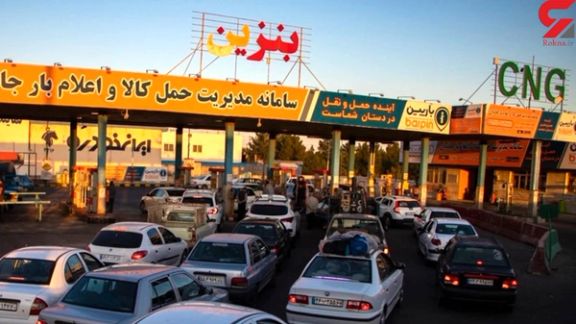
The cyberattack that crippled gas stations across Iran on Monday was claimed by a hacking group that Iran has previously accused of having links to Israel.
The hacking group "Gonjeshk-e-Darande" or Predatory Sparrow announced the attack on X, claiming that they took out “a majority of the gas pumps throughout Iran.” Tehran cites a “software problem" as the cause behind the nationwide shutdown and says about 90 percent of the stations will be back on track by the end of the day.
Oil Minister Javad Owji earlier told Iranian state TV that services had been disrupted at about 70% of Iran's petrol stations and that outside interference was a possible cause. Reza Navar, spokesperson for Iran’s petrol stations association, said 60 percent were out.
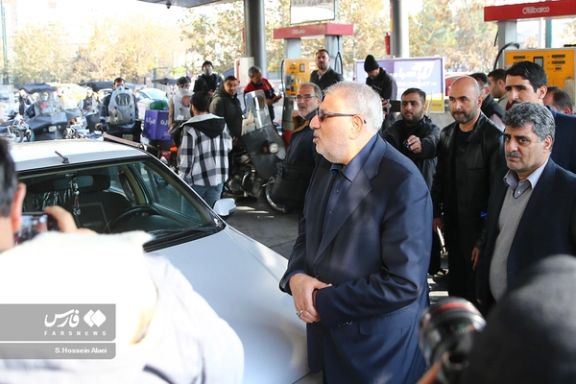
The hacking group, whose nom de guerre is a wordplay in reaction to Iranian state-backed cyber-crime outfit Charming Kitten, said in statements in Persian and English that “the cyberattack comes in response to the aggression of the Islamic Republic and its proxies in the region.” They added, “We will impose cost for your provocations. This is just a taste of what we have in store.”
Addressing Iran’s Supreme Leader, the group said, “Khamenei, playing with fire has a price.”
The attack comes as Iran’s proxies like Hezbollah in Lebanon and the Houthis in Yemen have stepped up attacks against Israeli and US targets on the backdrop of the war in Gaza. Hamas declared war on Israel on October 7 after its militia invaded by air, land and sea, killing 1,200 mostly civilians and taking 240 captives. Iran supports Hamas but says it did not play any role in the Islamist militants' October 7 terror attack.
As measures “to limit potential damage to emergency services,” the hacking group said it “delivered warnings to emergency services across the country before the operation began, and ensured a portion of the gas stations across the country were left unharmed for the same reason, despite our access and capability to completely disrupt their operation.”
The group rose to prominence as a hacktivist two years ago for a similar cyberattack on fuel distribution centers across Iran on the eve of the second anniversary of the bloody suppression of the November 2019 protests. In a separate incident, they claimed responsibility for hacking the state railway company.
Last year, the group garnered attention for successfully penetrating the computer systems of major steel companies in Iran. They went on to share videos and images showcasing their hacking prowess and operation. At the time Israeli military correspondents, who are regularly briefed off-the-record by senior Israeli officials, hinted that Israel was behind that hack, according to the Times of Israel.
Iran has a history of cyber incidents, with one of the most notable being the Stuxnet computer virus, believed to have been developed by the United States and Israel. The Stuxnet virus, discovered in 2010, was used to attack an Iranian uranium enrichment facility, marking the first publicly known instance of a virus being utilized to sabotage industrial machinery.
In the past few days, two refineries in Iran burnt down. Less than a week after a devastating fire engulfed the Birjand oil refinery in east Iran, another refinery in Esfahan (Isfahan) faced a similar fate as it succumbed to flames on Saturday, December 16. In the December 10 incident, all 18 hydrocarbon tanks at the Birjand oil refinery in South Khorasan were consumed by flames.
Hadi Beiginezhad, a member of the Energy Committee in the parliament, criticized the authorities for not learning from the past similar attacks, saying that administrations do not pay attention to the infrastructure of the fuel distribution network.
"We don't know if this incident is technically a hack or if a hack has occurred at all. But what we do know is that the infrastructure of product distribution in the country is facing issues because the enemy has been able to take advantage of our negligence, both in terms of investment and infrastructure,” he said, noting that “the enemy has learned well which channels to strike... They have infiltrators and can easily carry out such sabotage operations."
Iran has witnessed a series of industrial accidents, including fires in oil facilities, petrochemical plants, and industrial centers in recent years. The incidents are often attributed to outdated technology, the use of substandard equipment, and the aging and deterioration of structures. While authorities have not provided comprehensive explanations for these incidents, they have attributed several high-profile sabotage attacks to Israel. However, Israel has not officially claimed responsibility for any of the incidents. Notably, numerous unexplained explosions and fires have occurred at various Iranian military, nuclear, and industrial facilities, including pipelines and refineries, since mid-2020. On January 28, a significant fire erupted at an Iranian military industrial factory, suspected to be the result of a drone strike in Esfahan.
Every now and then, the Islamic Republic announces that it has busted Israel-linked groups planning sabotage operations against its facilities. Israel has neither denied nor confirmed the allegations.
Some Iranians speculate on social media that the hacking of the gas stations can serve as an excuse for the government to increase gasoline prices that are the cheapest in the world after Venezuela. The Iranian government sells one liter of gas for 3 US cents, or 10 cents a gallon, as a long-existing subsidy for domestic consumers. However, the Oil Ministry announced that the disruption at fuel stations is in no way connected to a change in gasoline prices.